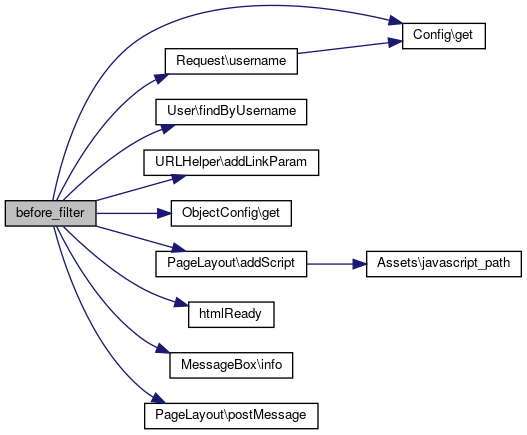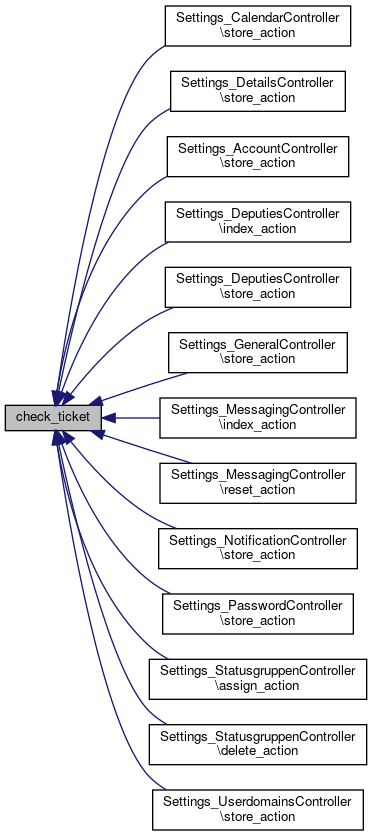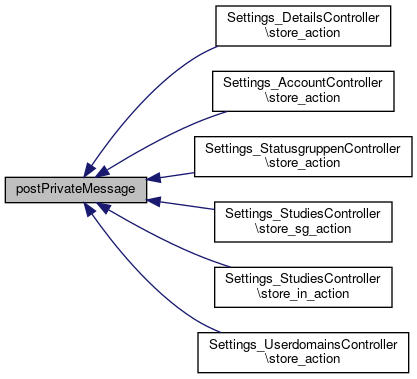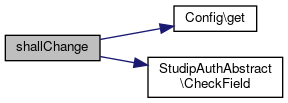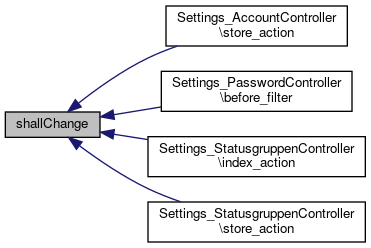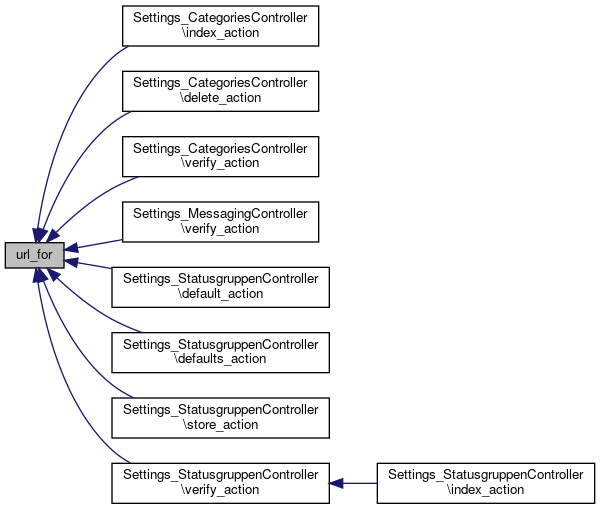|
| | before_filter (&$action, &$args) |
| |
| | url_for ($to='') |
| |
| | get_default_template ($action) |
| |
| | render_nothing ($text='') |
| |
| | shallChange ($field, $attribute=null, $value=null) |
| |
| | after_filter ($action, $args) |
| |
| | before_filter (&$action, &$args) |
| |
| | perform ($unconsumed_path) |
| |
| | after_filter ($action, $args) |
| |
| | validate_args (&$args, $types=NULL) |
| |
| | url_for ($to='') |
| |
| | link_for ($to='') |
| |
| | relocate ($to) |
| |
| | rescue ($exception) |
| |
| | render_json ($data) |
| |
| | render_csv ($data, $filename=null, $delimiter=';', $enclosure='"') |
| |
| | relay ($to_uri) |
| |
| | perform_relayed ($unconsumed) |
| |
| | render_template_as_string ($template, $layout=null) |
| |
◆ after_filter()
| after_filter |
( |
|
$action, |
|
|
|
$args |
|
) |
| |
The after filter handles the sending of private messages via email, if present. Also, if an action requires the user to be logged out, this is accomplished here.
- Parameters
-
| String | $action | Name of the action that has been invoked |
| Array | $args | Arguments of the action |
Reimplemented from StudipController.
◆ before_filter()
| before_filter |
( |
& |
$action, |
|
|
& |
$args |
|
) |
| |
Sets up the controller
- Parameters
-
| String | $action | Which action shall be invoked |
| Array | $args | Arguments passed to the action method |
Reimplemented from StudipController.
Reimplemented in Settings_AccountController, Settings_CalendarController, Settings_CategoriesController, Settings_DeputiesController, Settings_DetailsController, Settings_GeneralController, Settings_MessagingController, Settings_NotificationController, Settings_PasswordController, Settings_PrivacyController, Settings_StatusgruppenController, Settings_StudiesController, and Settings_UserdomainsController.
◆ check_ticket()
Generic ticket check
- Exceptions
-
◆ get_default_template()
| get_default_template |
( |
|
$action | ) |
|
Gets the default template for an action.
- Parameters
-
| String | $action | Which action was invoked |
- Returns
- String File name of the template
◆ postPrivateMessage()
| postPrivateMessage |
( |
|
$message | ) |
|
|
protected |
Add to the private messages
- Parameters
-
- Returns
- Object Returns $this to allow chaining
◆ render_nothing()
| render_nothing |
( |
|
$text = '' | ) |
|
Render nothing but with a layout
- Parameters
-
| String | $text | Optional nothing text |
- Returns
- String Rendered output
◆ shallChange()
| shallChange |
( |
|
$field, |
|
|
|
$attribute = null, |
|
|
|
$value = null |
|
) |
| |
Determines whether a user is permitted to change a certain value and if provided, whether the value has actually changed.
- Parameters
-
| String | $field | Which db field shall change |
| mixed | $attribute | Which attribute is related (optional, automatically guessedif missing) |
| mixed | $value | Optional new value of the field (used to determine whether the value has actually changed) |
- Returns
- bool Indicates whether the value shall actually change
◆ url_for()
Adjust url_for so it imitates the parameters behaviour of URLHelper. This way you can add parameters by adding an associative array as last argument.
- Parameters
-
| mixed | $to | Path segments of the url (String) or url parameters (Array) |
- Returns
- String Generated url
Reimplemented from StudipController.
◆ $private_messages
| $private_messages = array() |
|
protected |
The documentation for this class was generated from the following file:
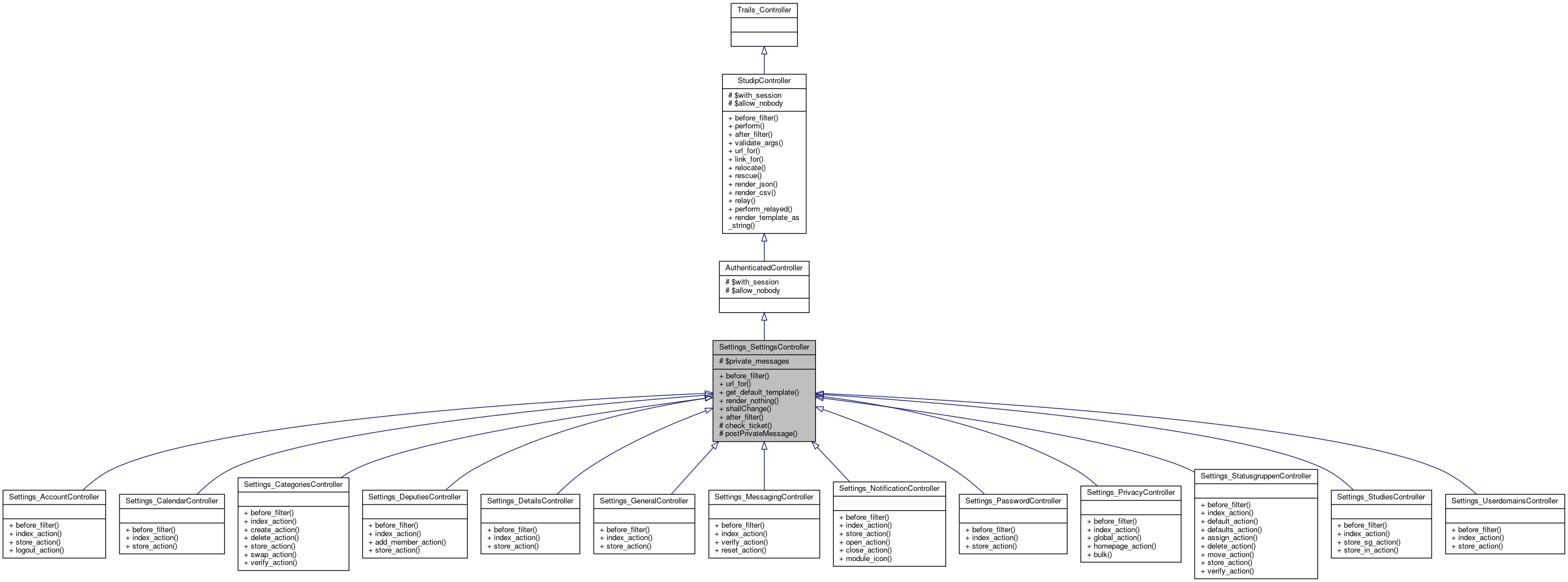

 Public Member Functions inherited from StudipController
Public Member Functions inherited from StudipController Protected Attributes inherited from AuthenticatedController
Protected Attributes inherited from AuthenticatedController Protected Attributes inherited from StudipController
Protected Attributes inherited from StudipController
